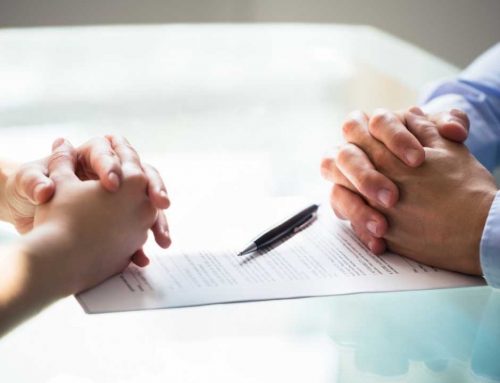If you have experienced a personal injury or illness, it can be a distressing time. This may be particularly relevant if you have suffered a life-changing injury which may have resulted in the loss of income, have had to introduce life-long care into your routine or are still suffering from your injuries or illness months after it has happened. In these cases, you may be entitled to compensation depending on the circumstances and the type of injury sustained. We want to help you understand the process of raising a personal injury claim so that you know what to expect should you be involved in an accident or experience illness.
What is included in the personal injury case process?
When a claim is made and the solicitor has agreed to take the case on, there is a process that must be followed which involves several steps.
Find out who was responsible for the injury
The first stage of the process is to understand who was responsible for the injury or illness. This is the person that the claim will be against. The person that may be claimed against may not be the person you expect – for example, if you were injured by a piece of machinery at work, it might not be your employer, but the manufacturer (this is viable if the machinery is faulty).
There are a number of people who may be responsible for your accident and these can include:
- Your employer for accidents or illnesses whilst at work (especially if it’s considered a dangerous job).
- A manufacturer for product liability claims.
- Restaurants for food poisoning claims.
- Hotels or cruise lines for many different types of accident or illness claims abroad.
- Councils or local authorities for slips, trips and falls in a public place that has been poorly maintained.
- A business you have visited for public liability claims.
- A Doctor, Hospital, Dentist or Private healthcare provider for Medical negligence.
- A driver, motorcyclist or cyclist for road accidents.
Typically, claims will be made against the insurers rather than those directly responsible for your accident. We will also be able to help in cases where the person(s) responsible aren’t known, such as a hit-and-run or uninsured driver. For any claim, we will need as much information as possible about the accident to help us through the next stages.
Gather evidence of the accident
At the beginning of your claim, you’ll need to tell your solicitor everything you remember about the accident, which may include:
- The location and time of the accident.
- If there were any witnesses to your accident – it’s ideal to get names and contact details.
- The events leading up to the accident.
- How the accident happened.
- Those responsible.
- The events after your accident – did you go to the hospital, receive first aid, etc?
- Any photos that were taken at the scene.
You don’t need to worry if you can’t remember everything or are speaking on behalf of someone else and don’t know the full story – your solicitor will be able to investigate further if necessary. There are a number of ways we can get evidence, through police reports (if they were involved), CCTV cameras or dashcam footage. Your solicitor will make contact with witnesses to get a statement in support of the claim.
Injury or illness assessment
Evidence of injuries or illness is vital to show the impact that they have had on your daily life. You will need to give permission for your solicitor to access any medical records that will provide evidence of a hospital or GP visit due to the accident or illness.
Should you need a medical assessment, you will be examined, asked about your pain levels, have photos taken of the injuries, asked how it’s impacted daily life and if it’s affected your mental health. All of the information will be kept strictly confidential at all times. The defendant may also request that you are medically examined by their own experts.
You may be required to undertake a second medical assessment, should your recovery affect the claim before a settlement is reached. This is to ensure that all the evidence gathered is as accurate as possible. Depending on the severity of the injury or illness, this may need to be repeated a number of times.
Rehabilitation and medical care
Medical care will be arranged for you to ensure you recover from your injury or illness. Where the level of care may not be provided by the NHS, you may need to consider private care which your solicitor will arrange. It is essential to cover the goals of your recovery so that they are achievable based on your injuries. If you need funding for your treatments, you can get part of your settlement money earlier to cover these costs.
Negotiating compensation
The amount of compensation you receive will depend on the severity of your injury or illness. Compensation is usually received under General Damages, but you can also claim under Special Damages which comprise losses in income, travel costs and the cost of treatment and care. It can also cover future losses, such as income and pension as well as further treatment. Other elements to take into account will include:
- Adaptive equipment, such as a wheelchair.
- Home adaptations or needing to move to a more adaptable home.
- Items damaged during the accident, such as clothes, your car and more.
Once the amount has been decided, your solicitor will approach the insurers with the figure. The insurers may counteroffer or offer their own settlement figure (known as a part 36 offer), which your solicitor can then negotiate until an amount is reached that is accepted by all parties. It is up to the claimant to decide whether or not to accept the settlement, but your solicitor will keep you informed all the way throughout the claim process.
If a settlement cannot be reached, it may result in court proceedings. The judge will weigh up the evidence to decide how much you should receive. You may need to give evidence yourself. If a settlement amount is reached before you go to court and you accept it, the court date will be cancelled.
In most cases, you will receive your compensation as the full amount, directly to you. In other cases, the court may decide to give you your compensation in monthly or yearly instalments. This may happen if there are long-term care costs to take into consideration.
How long will it take to make a claim?
This depends on the defendant and if they admit liability for a claim or if the settlement amount can be agreed on. If the defendant denies liability, it may take longer to go through the claims process, especially if an appearance in court is unavoidable. The majority of claims are handled between 12 and 24 months, but your solicitor will be able to offer guidance on how long it’ll take.
You have up to 3 years to make a personal injury claim and this begins from the date of your accident, but this is different for children under 18, who will have 3 years from the date of their 18th birthday to make a claim.
Do I need to go to court for a personal injury case?
There are a number of different pre-action protocols that are followed to ensure that all parties involved provide the necessary information at the same time. These rules were set by the Ministry of Justice in order to streamline the claims process and remove the need for court intervention. The protocols may include:
- A letter to notify the defendant that a claim has been made against them. Different processes and timescales will apply to each individual claim, depending upon the value of the claim and the type of claim.
- The defendant will need to respond to the letter and accept liability or provide evidence as to why they believe they are not liable.
- If it’s a medical negligence claim, we will need some medical evidence before starting the claim. If the claim is based on personal injury, we will receive evidence after starting the claim.
If the defendant denies liability for a case, they must provide evidence to support their claim which may include witness statements from those who saw what happened or family members who have had to look after the claimant as a result of the accident or illness. If they are still denying liability, your solicitor may begin court proceedings on your behalf. They may also do this if there has been a breach in the pre-action protocols by the defendant or the settlement figure isn’t agreed upon during negotiation. You will be advised on whether or not your claim will be taken to court by your solicitor.
“No win, no fee” personal injury claims
Some solicitors offer a “no win, no fee” service, which means that the claimant won’t have to pay any legal fees, should they lose their case. They may still need to pay any fees relating to the work undertaken by the solicitor, such as ID checks or any other disbursements accrued. When you begin a claim, you’ll be given a Conditional Fee Agreement (CFA) which details how it works. When you have signed it, your solicitor will:
- Gain an understanding of the effect your injuries have had on you.
- Gain evidence in support of your claim.
- Manage all areas of the claim, so that the claimant doesn’t need to deal with insurers.
- Offer counters to the defendant, should they deny liability.
- Get the best compensation amount, depending on injuries or illness.
Should you win the injury claim, your solicitor will deduct a small amount from your compensation settlement. By law, this is capped at 25% and any additional fees that you need to pay will be agreed in the CFA.
Personal Injury Case Advice
A personal injury or illness can be a stressful time and our aim is to get you the compensation you deserve as soon as possible. The team here at Beeston Shenton have over 35 years of experience in personal injury law and will work closely with you to understand your circumstances, offering a friendly service and expert knowledge to help you reach a settlement that you are happy with. Whether you’ve been in a road traffic accident or had an accident at work, we handle a wide variety of claims so you can rest assured you’re in good hands. Contact us today to make an inquiry or to find out more about this service. Alternatively, you can find out more about a mixed injury claim.




